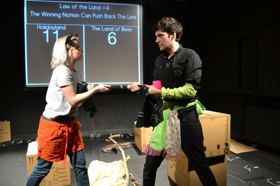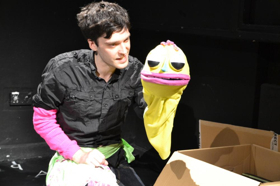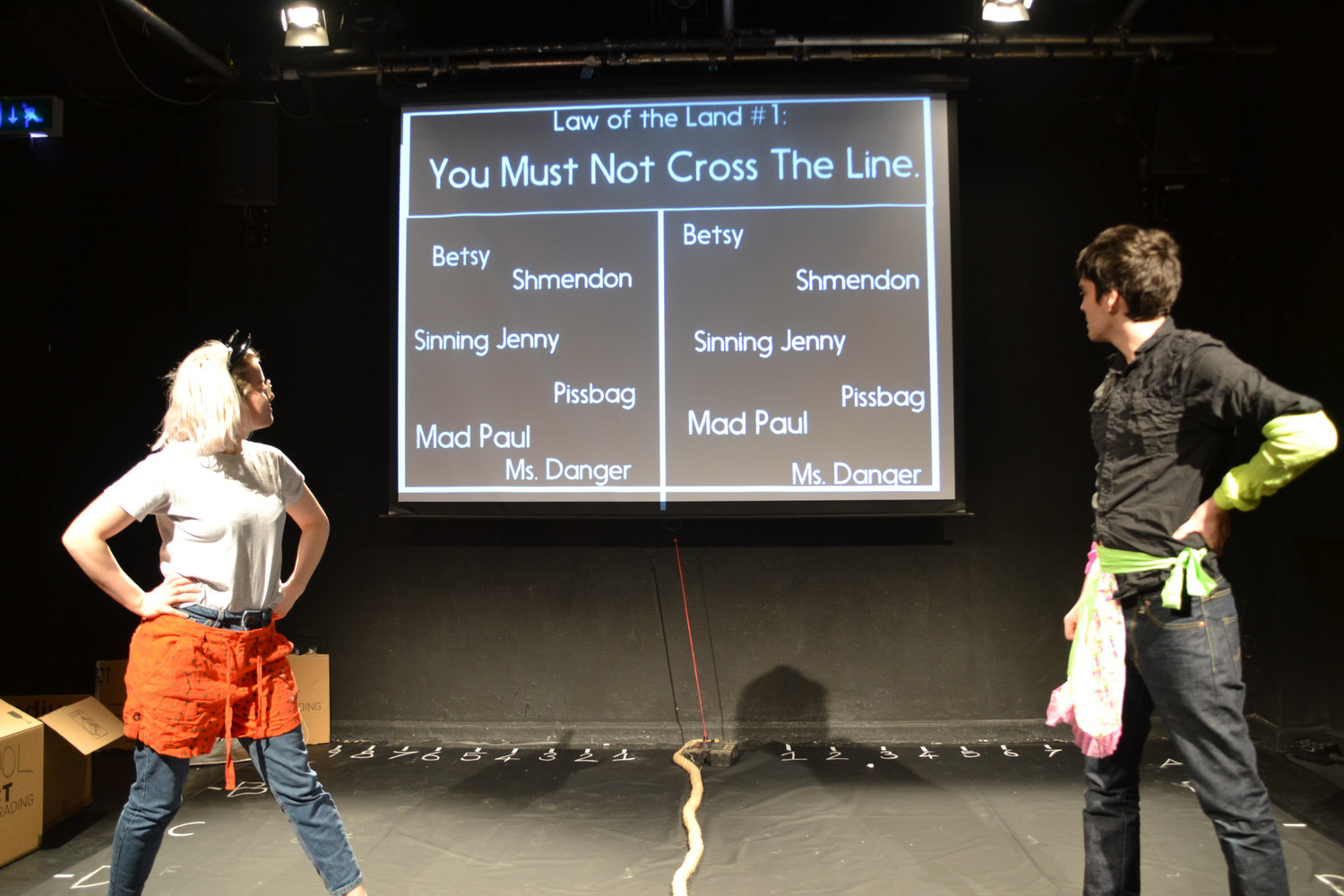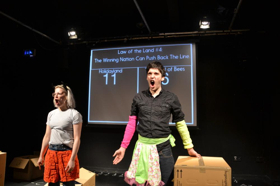Interview: Anoushka Bonwick And Elliot Hughes Talk DRAWING THE LINE at The Albany

at Camden People's Theatre
After sell-out runs of their award-winning show Standard: Elite in Brighton and Manchester, Hidden Track have come up with a new theatre game about politics and unity.
We caught up with the team behind Drawing The Line, Artistic Director and writer Elliot Hughes and Associate Director Anoushka Bonwick, after their scratch night back in March when they presented the first half of their participative play ahead of their run at The Albany in May.
In their piece - commissioned from the theatre as part of their Rebels season - a "line" divides two sides of the audience. Everyone is responsible for the wellbeing of their "nation" and each faction determines how well they develop as a state.
Did you write it together?
Anoushka: Elliot's the main writer - I'm very much not a writer. This time we've done more of a script development from the starting stage, so myself and the performers have pitched in to the process. It's kind of evolved as we've done rehearsals rather than working on a stock script.
Do you already have the second part ready?
Elliot: It's been in development. We know the beats we want to hit and the structure we're going to use. The second half is quite different from the first. It's much more story-focused and much more political. The first half is about making it really fun and making people buy into this idea that we've made two nations and we've got two teams.

at Camden People's Theatre
In the second half we're introduced to a whole new character, who's someone from the nation who's lost and has been abandoned by their leaders. The losing part becomes more and more destroyed and rundown as time goes by.
These characters really want to go over the line and cross into the other, wealthier nation. We explore the idea of tribalism and how easy it is for people to be divided and believe that those are their people and those are not. But also we shine a light on how quickly people can be united.
How did you build the show?
Elliot: We knew we wanted to split the nation in two; we wanted to start with an empty stage and by the end we wanted to have built a city, almost. The core gameplay, if you want, was to start from totally nothing, then people draw a map, then we wanted them to have different ways to create something.
Anoushka: We wanted the game to have points, but very early on we had this idea that it was the audience who were going to build the nation, essentially. Everything is going to look different every night. From piecing that together, we knew what beats needed to be hit by the single games.
We had a week's worth of R&D where we all got into a room together and we looked exactly at what we needed from the games: what materials we had at our disposal, how the games were going to work and what the actual mechanics were going to be, how fun they were going to be, whether they were going to be fun to watch and if not how we could make them fun to be watched. And then we did some game-testing as well to make sure that we could get to the end with them.

at Camden People's Theatre
You give the opportunity to the audience to decide whether they want to participate or not - what happens if nobody comes forward?
Elliot: We have thought about this. If, say, we need three people for a game and we hit the number from one side but from the other only one steps forward, they'll have to manage with that. We would basically play into it and make a joke out of it saying "this person has to deal with everything at once".
Anoushka: It puts them at a disadvantage, so it's an incentive for them to want to participate. If they only have one person for the war, they'll have to go ahead.
Elliot: In fact, the main idea of running the score at the back was also to get people to take their responsibility and not have their nation lose a point.
What would you like the audience to take from it?
Anoushka: All of our work centres around looking at things from a political narrative. We really want people to come away feeling that this sense of "us and them" is a situation you can find yourself in very easily and it can be built on very superficial terms.
What that can also mean, in reverse, is that you can build a community with people who have just arrived, you can welcome them and make a new place. We want people to feel that dichotomy and how easy it is to be divided, but how easy it is to be united as well.
Elliot: I kind of approach all our political stuff making it fun to start with. Especially this kind of audience interaction, you sometimes go to these things and when they ask for a volunteer, your first gut reaction is "For the love of God, don't look at me!", so the most important thing is to make the audience relax and build an atmosphere where you can say "I'll go for a bit and then if I don't feel like it I can step down".

at Camden People's Theatre
The core is to get everyone on our side and to have fun. It's all about developing group dynamics without explicitly doing it. We do it through games so you're not paying attention, but we made you hate an entire part of the room for five seconds, we made you believe that that one person has more in common with you than anyone else in the world.
We kind of go "Here's the political point", but it's always while lulling people into a false sense of security. And then we examine what we've just done.
The first part is really funny - will the second part have the same tone?
Elliot: It will not stop being funny and it won't stop being silly. There will never be a point where you can't imagine there won't suddenly be another joke. The main thing is, the silly ridiculous characters will all have an agency and a life and a meaning. They all care about stuff. The difference in the second half is that the funny characters you were introduced to, we see them not get what they want and genuinely struggle with resources.
One of the main things is that the ones who have a lot of stuff are starting to run out and that's how we start. The character who goes on a journey through this new world meets lots of different others who, in some way, want to get across the line or don't want to but have to. We're essentially exploring narratives of refugees and such without explicitly doing it.
Are you keeping it frontal, like at Camden People's Theatre?
Anoushka: The next time, it's going to be on three sides.
Elliot: We want the audience to be able to look at each other in the eyes.
Anoushka: I want it to feel like an arena. The space we have, the Deptford Lounge, is a humongous sports hall, so in terms of the staging, we need to bring that insular kind of feeling to it to make it intimate.
Drawing The Line is running at The Albany from 9 to 25 May.
Comments
Videos

